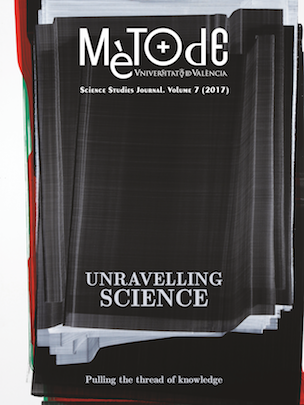Charles Darwin and ideology: Rethinking the Darwinian revolution
DOI:
https://doi.org/10.7203/metode.7.7887Paraules clau:
social Darwinism, Herbert Spencer, evolution, competition Resum
Resum
This short paper critiques the idea of any coherent Darwinian ideology. Charles Darwin himself did not adopt any obvious ideology, except perhaps that of anti-slavery. However, his published work, and that of other evolutionists, led to the emergence of social Darwinism. Herbert Spencer’s role in fostering social Darwinism, and the rise of eugenics, are briefly described. The connection, if any, between the historical figure of Darwin and the social movement that bears his name is discussed. While Darwin’s On the origin of species or The descent of man can hardly account for all the racial stereotyping, nationalism, or political bigotry seen in the half century after his death, there can be no denying the impact of his work in providing an authoritative biological backing for eugenics, colonial belligerence, and western notions of racial superiority.
 Descàrregues
Descàrregues
 Referències
Referències
Bannister, R. (1989). Social Darwinism: Science and myth in Anglo-American social thought. Philadelphia: Temple University Press.
Bowler, P. J. (2013). Darwin deleted: Imagining a world without Darwin. Chicago: University of Chicago Press.
Browne, E. J. (1995). Charles Darwin: A biography. Vol. 1. Voyaging. New York: Knopf.
Browne, E. J. (2002). Charles Darwin: A biography. Vol. 2. The power of place. New York: Knopf.
Cooter, R. (1984). The cultural meaning of popular science: Phrenology and the organization of consent in nineteenth-century Britain. Cambridge: Cambridge University Press.
Costa, J. T. (2014). Wallace, Darwin, and the origin of species. Cambridge, MA: Harvard University Press.
Desmond, A. J. (1989). The politics of evolution: Morphology, medicine, and reform in radical London. Chicago: University of Chicago Press.
Desmond, A. J., & Moore, J. R. (1990). Darwin. London: Michael Joseph.
Desmond, A. J., & Moore, J. R. (2009). Darwin’s sacred cause: How a hatred of slavery shaped Darwin’s views on human evolution. New York: Houghton Mifflin Harcourt.
Hawkins, M. (1997). Social Darwinism in European and American thought 1860-1945: Nature as model and nature as threat. Cambridge: Cambridge University Press.
Hofstadter, R. (1944). Social Darwinism in American thought, 1860-1915. Philadelphia: University of Pennsylvania Press.
Jones, G. (1980). Social Darwinism and English thought. Sussex: Harvester Press; Atlantic Highlands, NJ: Humanities Press.
Kevles, D. J. (1985). In the name of eugenics: Genetics and the uses of human heredity. Berkeley, CA: University of California Press.
Lightman, B. V. (1987). The origins of agnosticism: Victorian unbelief and the limits of knowledge. Baltimore: Johns Hopkins University Press.
Lightman, B. V. (2007). Victorian popularizers of science: Designing nature for new audiences. Chicago: University of Chicago Press.
Lightman, B. V., & Fyfe, A. (Eds.). (2007). Science in the marketplace: Nineteenth-century sites and experiences. Chicago: University of Chicago Press.
Paul, D. B. (2009). Darwin, social Darwinism, and eugenics. In J. Hodge, & G. Radick (Eds.), The Cambridge companion to Darwin (pp. 219–245). Cambridge: Cambridge University Press.
Pearson, K. (1892). The grammar of science. London: Walter Scott.
Secord, J. A. (2003). The extraordinary publication, reception, and secret authorship of Vestiges of the natural history of creation. Cambridge: Cambridge University Press.
Spencer, H. (1891). Essays: Scientific, political and speculative. London: Williams and Norgate.
Uglow, J. (2002). The Lunar men: The friends who made the future 1730–1810. London: Faber & Faber.
Weikart, R. (2006). From Darwin to Hitler: Evolutionary ethics, eugenics and racism in Germany. New York: Palgrave Macmillan.
Werth, B. (2011). Banquet at Delmonico’s: The Gilded Age and the triumph of evolution in America. Chicago: University of Chicago Press.
Young, R. M. (1985). Darwin’s metaphor: Nature’s place in Victorian culture. Cambridge: Cambridge University Press.
Descàrregues
Publicades
Com citar
-
Resum3563
-
PDF 1042
Número
Secció
Llicència
![]()
Tots els documents inclosos en OJS són d'accés lliure i propietat dels seus autors.
Els autors que publiquen en aquesta revista estan d'acord amb els següents termes:
- Els autors conserven els drets d'autor i garanteixen a la revista el dret a la primera publicació del treball, llicenciat baix una llicència de Reconeixement-NoComercial-SenseObraDerivada 4.0 Internacional de Creative Commons, que permet a altres compartir el treball amb un reconeixement de l'autoria del treball i citant la publicació inicial en aquesta revista.
- Es permet i s'anima els autors a difondre la versió definitiva dels seus treballs electrònicament a través de pàgines personals i institucionals (repositoris institucionals, pàgines web personals o perfils a xarxes professionals o acadèmiques) una vegada publicat el treball.





